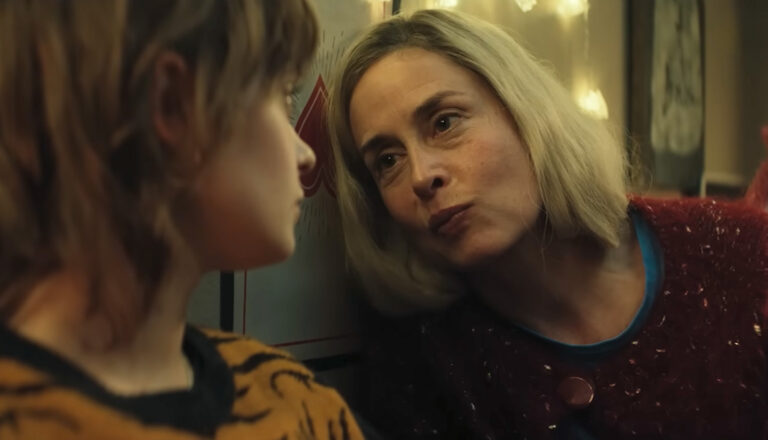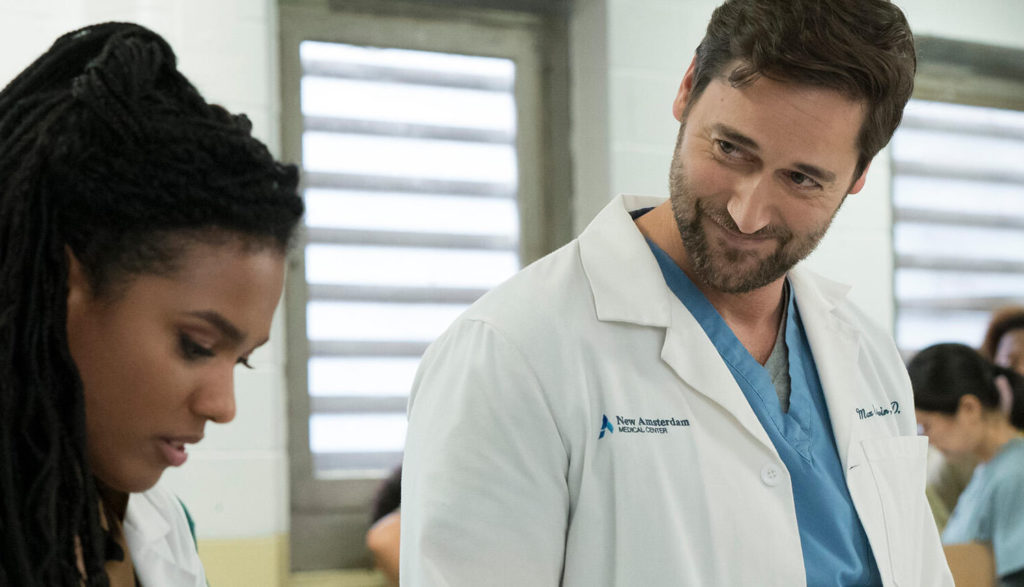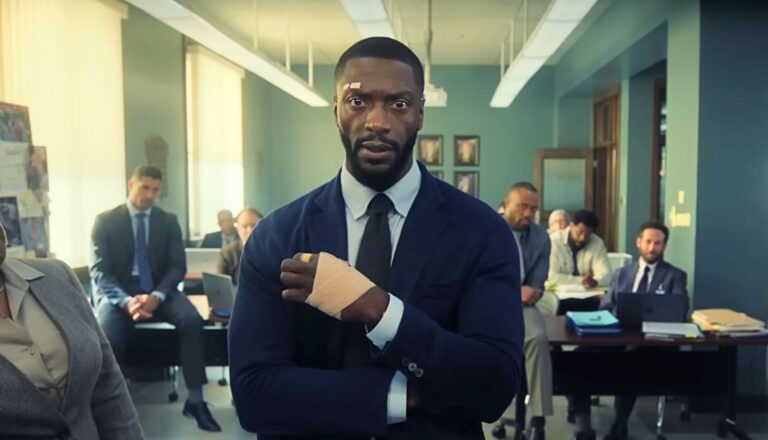
Unfamiliar
Filled with gritty violence and foul language, when it comes to this German spy drama, “unfamiliar” is how most viewers should stay.

“First, do no harm.”
That’s what most of us non-doctors think we know about the Hippocratic Oath, a statement of care that all physicians are supposed to abide by. Easier said than done. Turns out, that phrase doesn’t actually appear anywhere in the Hippocratic Oath.
And in the United States, where healthcare costs can be prohibitive for some, the system can be a maze of red tape and long waits—especially for veterans. For those enduring seemingly interminable delays, that well-meaning phrase can easily ring hollow. Hippocratic? These critics might call it something else: hypocritical.
Others might take issue with that characterization of the nation’s healthcare system, of course. But not the characters populating the rooms and corridors of NBC’s medical drama New Amsterdam. These dedicated doctors, nurses and administrators want to change their hospital, one outlandishly exciting case at a time.
All this do-gooding begins with the appropriately named Dr. Max Goodwin, who’s given the keys to the storied New Amsterdam public hospital and told to keep the old gal running. Maybe even give her a little tune up.
But (continuing with the car metaphor) Max isn’t content just to give the hospital an oil change. No, he yanks out the engine and starts rebuilding the thing, doctor by doctor. Gone are physicians who put “billing over care.” He encourages his staff to see the ailing folks in New Amsterdam as “people.” He’s an idealist in scrubs, and he’s surrounding himself with like-minded compassionate caregivers.
His most prominent hire is Dr. Helen Sharpe, a celebrity doctor who forsakes her cushy job on the morning telly to get back into real medicine again. (Oh, and because she is kinda famous, Dr. Sharpe often serves as an effective spokesperson for the hospital when it comes to asking for money.)
Others have been around for a bit longer and are (ahem) pretty familiar with each other. Take dedicated docs Laura Bloom and Floyd Reynolds. The former is such a talented doctor that she resurrects someone in the first episode. The latter is determined to populate his personal staff with folks of every race, gender and ethnicity. And he and Bloom sleep together on occasion, too.
But while Max and his well-meaning cohorts are indeed changing New Amsterdam, every day comes with its own special set of challenges. Patients with outrageously difficult problems roll in for help. Doctors develop addictions and eating disorders. The hospital’s higher-ups are nervous about Goodwin’s good intentions. And Max has some personal issues of his own: His own wife passed away just after giving birth to their daughter. He’s personally taken on the opioid epidemic. And he’s battling his own cancer diagnosis.
Most mainstream critics have not been kind to New Amsterdam. It’s more wish fulfilment than an actual drama, they say, led by an impossibly pure-of-heart leader (Max) who seems to have the answer for every problem. It suggests that the country’s medical miasma can be conjured away through a magic stethoscope and good intentions. USA Today’s Kelly Lawler calls it “achingly predictable, sickly sweet and emotionally manipulative.”
True enough. But let me zag from that zeitgeist zig. I’d suggest that in our age of well-crafted but bleak dramas, there’s still room for a show that offers a sweet respite (sickly or not) from TV’s horrors elsewhere, a place where scripts can unapologetically pluck at heartstrings and “heroes” don’t need an “anti” attached.
New Amsterdam has its issues. Of course it has issues. It’s a medical drama, after all: Doctors sleep with other doctors (including some same-sex pairings). Patients come in with a variety of ailments that can touch on the risqué—and sometimes we witness messy surgeries onscreen. The show certainly proffers plenty of thoughts on how to fix healthcare, too, ideas and ideals that conservative-leaning audiences may not jibe with.
But for all that, New Amsterdam, like its doctors, has heart. Its characters care about those who walk through these fictional doors, going above and beyond to help needy patients. These physicians and nurses act, in other words, like many of the real heroes in our midst: mothers and fathers, teachers and counselors, youth pastors and—yes—even doctors.
In its most recent episodes, New Amsterdam also pays tribute to everyone affected by the coronavirus pandemic—actually removing an episode filmed before the outbreak, titled “Pandemic,” because it felt a little too real and too scary. Cast members, including newcomer Daniel Dae Kim (who contracted the virus himself) thanked essential workers for their hard work and dedication and offered sympathies to those who have lost loved ones to the illness.
Do no harm? Can’t say that New Amsterdam is harmless. But it wants to heal, too, showing us good people trying to do mostly good things.
Max looks for new ways to fight against increasing opioid addictions. The doctors of New Amsterdam try to save one of their own after his heart was badly damaged by COVID-19.
Doctors perform surgery on a heart, and we see the organ and lots of blood. We see people wearing masks to prevent the spread of the coronavirus. We hear about people who died after contracting it. A man nearly dies during surgery and experiences a near-death experience in which he travels to a type of heaven where his long-dead wife encourages him to fight for his life.
A woman gives birth, and we see her exposed stomach and part of her chest. A woman says she “fantasized” about a fellow doctor while quarantined, but she later flinches away when he tries to touch her.
An orderly is arrested for stealing drugs from the hospital to help his mom. Another man gets arrested after using bike messengers to deliver opioid drugs to his patients. People discuss the need for opioids and also the need to control the drug usage and distribution, in order to prevent overdoses. We learn that a doctor became addicted to prescription drugs herself and nearly killed a patient while high.
A man says his dad took an “interest” in his weight when he was just 9 years old, leading to a lifelong eating disorder. He also admits that he tried to hang himself when he was in middle school because he hated how he looked. After discovering that he hasn’t eaten for three days, his friend confronts him about spreading this message to his own children, and he agrees to get professional help.
We hear uses of “d–n” and “h—,” as well as misuses of God’s and Christ’s names.
A pregnant prisoner gets wheeled into New Amsterdam with a life-threatening condition: She needs to deliver right away, lest she and the baby die. But the prisoner doesn’t want to give birth. That’s because if her baby is born now, it will wind up in foster care, separated from her. Meanwhile, Max tries to woo a rich widow for a $10 million donation. And a mentally ill man comes in, claiming to be invisible.
The psychotic man was found in a graveyard, naked (we see his bare back and part of his rear), weeping over his lost fiancée. He wanders around the hospital in a similar state of undress (though we see him only from the waist up), and doctors learn that the needle marks on his arm came from shooting himself up with formaldehyde.
We also see the pregnant prisoner in the delivery room: The baby is delivered safely, the newborn held by a pair of bloody gloves. The mother refuses to touch the baby at first, not wanting to bond with the girl only to suffer having her baby immediately taken away from her. (Later, everything works out for the mother, thanks to a timely donation from the rich widow, who funds a maternity ward and mother’s facility at the prison.)
A same-sex female couple interviews a doctor to see if she’s suitable to guide them through a pregnancy. Max keeps a secret from his wife and others. Max’s boss blusters about Max’s management of New Amsterdam, using a crass term referring to the male anatomy as he does so.
We hear quips about the loss of government-funded health care. A doctor swallows pills, perhaps to keep awake. A widow says that her late husband’s “mistresses” were like “steaks and cigars” to him. We hear about a fractious relationship a doctor has with his son. A couple of profanities are heard, including “p-ss” and “holy h—.” God’s name is misused twice.

Paul Asay has been part of the Plugged In staff since 2007, watching and reviewing roughly 15 quintillion movies and television shows. He’s written for a number of other publications, too, including Time, The Washington Post and Christianity Today. The author of several books, Paul loves to find spirituality in unexpected places, including popular entertainment, and he loves all things superhero. His vices include James Bond films, Mountain Dew and terrible B-grade movies. He’s married, has two children and a neurotic dog, runs marathons on occasion and hopes to someday own his own tuxedo. Feel free to follow him on Twitter @AsayPaul.

Emily studied film and writing when she was in college. And when she isn’t being way too competitive while playing board games, she enjoys food, sleep, and geeking out with her husband indulging in their “nerdoms,” which is the collective fan cultures of everything they love, such as Star Wars, Star Trek, Stargate and Lord of the Rings.

Filled with gritty violence and foul language, when it comes to this German spy drama, “unfamiliar” is how most viewers should stay.

Oliver Twist’s Artful Dodger isn’t 13 anymore: He’s an adult. And being an adult comes with more grown-up problems.

Though it’s compelling, the content concerns in Prime Video’s ‘Cross’ might be enough to cross it off your watch list.

‘The ‘Burbs’ is Peacock’s attempt to adapt the 1989 movie of the same name. But a fresh coat of paint doesn’t hide the content issues.